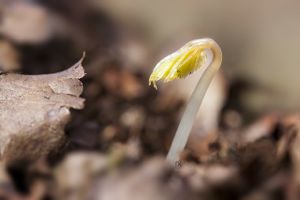What’s the key to future writing success?
It’s the season for planting, and if you’re thinking only about gardens and flowers, it’s time to expand your point of view.
The key to writing success lies in planting seeds.
It’s what we do today, tomorrow, and next week that determines what crops we’ll reap in the coming months, and even a year or two down the road.
Start Now to Improve Your Odds of Success
It’s not always easy to remember that. When we’re slaving away at our desks for long periods of time with little to no feedback, we can start to wonder if the work is worth it.
We can’t always be sure what the rewards will be, either. Maybe our efforts will result in a book publishing contract or a bestselling title. Maybe they’ll turn into a byline in a respected journal, or an invite to share our knowledge with others.
But maybe what we’ll have is a novel that stays in the bottom of the drawer forever. Ugh. But even a failed novel teaches us what we need to know for the next one.
No matter what, we have to keep planting seeds, dropping them in the dirt in preparation for the future. If we stop, we lose all chance of seeing our dreams come true.
What seeds can we plant as writers that will help improve our odds of success?
 Future Writing Success Tip 1. Keep Notes
Future Writing Success Tip 1. Keep Notes
If you’re like me, you have little pieces of paper floating around all over the house.
They contain ideas that popped up wherever and whenever, right before sleeping or just after waking up, while watching a movie (yes, I regularly scratch notes on my little notebook in the dark), while driving somewhere, or while enjoying a meal.
If you regularly keep notes, something magical happens—you generate more ideas. The more your brain is used to coming up with them, and the more you honor the process by taking notes, the more your brain will respond.
You’ll end up with an endless supply of ideas for your work in progress, your blog, and any other projects you’re working on.
“I carry a little Moleskine cahier notebook in my front right jeans pocket at all times,” says freelance writer Charlie Sorrel, “along with a Jetstream pen….What I do is take a quick note whenever anything grabs me. A bit of dialogue, an idea, a situation or a detailed description of something I see and want to remember later. You can get away with taking notes during dinner in a restaurant, or in the middle of a conversation—try that with an iPhone—so it really is handy.”
2. Write Every Day…or Close To It
There are writers who do extremely well writing in spurts. If you’re one of these, ignore this tip, but for most of us, writing regularly is the key to planting the seeds of future stories.
For most of us, writing is a muscle we have to use regularly or it falls out of shape. I know that as a horn player, if I go for awhile without practicing, it takes me weeks to get my chops back in playing form. It’s the same for writing—when I’m doing it every day, the words flow a lot easier.
When we write every day, we also build up a stack of pages that are like seeds in the garden, ready to sprout into mature blog posts or stories or novels.
Says American novelist Nicholson Baker:
“One huge piece of advice came to me from Bill Whitworth, who was the editor of the Atlantic Monthly, and I was so in love with reading the Atlantic at the time. Once or twice I got a chance to work with Bill Whitworth on a piece or two—and I was just kind of struggling to support myself and, you know, life is busy and I wasn’t writing that much. He just said very simply, ‘Are you writing every day?’ and I said, ‘Ummmm,’ and I sort of mumbled because I couldn’t say yes.
“It was a horrible feeling, and the day after that, I started writing every day. That would have been 1984 and I tried to write every day since then. It has helped me a lot, so that was probably the most helpful piece of advice I got early on.”
 Future Writing Success Tip 3. Submit, Submit, Submit
Future Writing Success Tip 3. Submit, Submit, Submit
This was something I didn’t do enough of when I was getting started.
I justified it by telling myself I was still working on craft, but I was shooting myself in the foot.
The only way you’ll get exposure is to submit, and most of us don’t submit enough. We can send short stories and poems to journals and online publications. We can send children’s stories to magazines and book publishers, and we can send novels plus all of the above to contests.
We can write articles and submit them to blogs and magazines and more. There are a ton of opportunities out there today. We just need to write and submit and repeat.
Each time we submit, we’re planting a seed. It may wither away in a rejection, but then again it may take root and grow. We increase our odds by submitting more often.
4. Incubate Your Ideas
Seeds spend weeks in the dark of the underground before they burst forth in the sunlight. Your ideas need the same kind of time and protection so they don’t lose their power before you have a chance to really try them out.
This is where a writing journal comes in handy. You can grab that piece of paper where you jotted down your idea, freewrite on it for a page or two, and then close the journal and let it sit for a few weeks before you come back to it.
If you do this regularly, you’ll see that many of your ideas lose their sparkle over time, and die on the page. But some will rise up and shine in the sunlight, and you’ll be able to tell which ones when you go back and re-read. Then you can choose one and go forward with it, either in a short story, poem, or potential novel.
You might also notice something else as you work in this journal—a pattern. You may see a theme among the ideas, one that helps point you toward your writer’s voice or your preferred genre of writing. The possibilities are endless, but they do require that you keep up with the journal on a regular basis.
 Future Writing Success Tip 5. Plan Time Off, Again and Again
Future Writing Success Tip 5. Plan Time Off, Again and Again
I have this one on the list because a) we Americans don’t take enough time off, and b) idleness leads to creative thoughts.
We are all so busy these days. We run from one activity to the next and collapse at night exhausted. We struggle to find time to exercise and eat right, say nothing of nurture the seeds of our creativity.
But creativity needs time and space. It needs quiet and long walks and novel sites and sounds. Studies have shown that it’s when we’re bored or idle that the ideas come to us, exploding in our heads like popcorn.
When we’re in the regular routine of life, we can have a hard time gaining access to these ideas. That’s where time off comes in. Whatever you’re taking, it’s probably not enough, but you do what you can do. Try to fit in more small breaks where you go away for just a weekend or a four-day trip.
Don’t stay in your house. Go somewhere new, even if it’s only fifty miles down the road. You need to see new things, expose yourself to stuff you haven’t seen or heard before. That’s what sparks ideas.
6. Attend a Writer’s Event or Take a Class
When you go to a writer’s conference, an author reading, or a writing class, you’re planting seeds in your brain and your heart. Being around other writers gives you a sense of belonging, and you carry that feeling home with you. It’s motivating. It’s encouraging.
This is also about continuing education. We can all learn no matter where we are on the writing journey. And each time we learn something new, that’s a new seed in our writing garden, waiting to grow into something even better than what we grew before.
“Like the protagonists in our books, we too have turning points in our author journeys,” says bestselling author Kristen Lamb. “A conference is our way of accepting the challenge and rising to the call. It means we are willing to invest in our dreams.”
 Future Writing Success Tip 7. Plant Seeds of Belief
Future Writing Success Tip 7. Plant Seeds of Belief
Belief if the hard one, especially when you’re working hard and have little to show for it.
That’s why writers must plant seeds of belief in themselves on a continual basis. We have to encourage ourselves first and foremost. This writer’s life isn’t easy, and if we’re going to survive the inevitable ups and downs, we have to learn how to coach ourselves, and most of all, how to encourage ourselves.
How do you plant seeds of belief? You act “as if.” When you wake up in the morning, tell yourself “I am a bestselling author” (or whatever your dream is). Take every encouraging word you’ve received on your writing and put it together in a frame or collage and post it near your writing area so you can see it regularly.
Help other writers. Mentor and teach if you can. Celebrate every win. Go overboard with your self-encouragement and you “may” almost get where you need to be. (That’s how self-critical most of us are.)
Do you regularly plant seeds as a writer? Please share your ideas with our readers.


nice post. I would add #8- Read read read!
Thanks, Tina. Oh yes–a good one. :O)
Love this post! Will share it and bookmark it so I can come back to it.
So glad, Denise! It’s the season for planting! :O)
Thanks for this, Colleen. It’s the season for planting in upstate New York. I vowed to give myself a summer to contemplate, take good care of my health, and plant seeds in the dirt while I also plant seeds for a new book and workshops.
I do most of what you suggest, although number 7 is always a challenge. I fertilize my ideas is reading. Daily doses of well written fiction and nonfiction, mythology, and Jungian psychology
New book! Exciting, Elaine. Yes, I think #7 is one of the toughest for most of us. Happy gardening! :O)